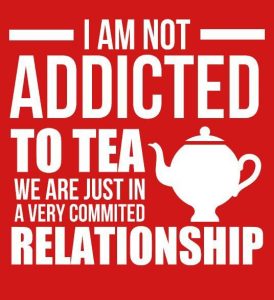Life
Tea-Powered
by
It’s possible that I might be a tea-powered life form. I’ve seen a meme about coffee saying something to the effect of turning magic beans into stories, but with me it’s magic leaves.
This realization came courtesy of a book I read recently, The Busy Brain Cure. A neurologist found that there seems to be a link between lack of focus, anxiety, and insomnia, and she calls this “busy brain.” It’s the result of chronic or recurring stress. Since lack of focus, anxiety, and insomnia are pretty much my life, I found it interesting. The book offers an eight-week protocol for addressing it, and since there wasn’t anything in it that looked potentially harmful, I thought it might be worth giving it a shot.
The first couple of things were common insomnia recommendations. There was setting a consistent bedtime and wake time. I generally do this anyway, other than weekends, when I let myself sleep a little later (and then I usually wake at the same time, but then let myself go back to sleep). It’s not a major lifestyle change to set an alarm on weekends, especially since I use a light-up alarm, so I don’t have sound that startles me awake, just a light that comes on gradually so I feel like I’m waking up naturally.
The next thing was a digital detox, with no screens or devices thirty minutes to an hour before bedtime. Again, that’s something I usually do anyway, unless the book I’m currently reading is an e-book (she includes e-readers and tablets as screen and devices). I seldom watch TV that late, and while I’m tempted by e-mail and social media while I’m at my computer, once I leave my office I don’t think about checking it, and I ignore my phone most of the time. So, no major lifestyle change other than trying to start my weekend movies early enough for them to be over an hour before bedtime.
Then we got to the diet week. It’s not a huge shift, since the focus is mostly on adding healthy fats and low-glycemic index foods rather than on cutting anything out, and that’s mostly the way I eat, anyway.
But the real issue there was with caffeine. She recommends not having caffeine first thing in the morning because that’s when cortisol levels are naturally higher. You get more benefit from the caffeine by waiting to have caffeine a few hours after you wake up. The best time to have caffeine is between about 9:30 and 11 a.m., and none after 1 p.m. Also, no caffeine within an hour of having sugar or things made with white flour. There was something sciencey that I didn’t take notes on about the interaction of sugar and caffeine that does something about inflammation.
This is a major lifestyle change, as I drink tea with breakfast, which is a double whammy, as it’s first thing in the morning and usually involves sugar and flour (I usually eat whole wheat toast, but with cinnamon sugar or some kind of jam or fruit butter). Then there’s some kind of baked good with tea in the afternoon. But I thought I’d give it a shot. I know that a lot of what I like about tea is the warm liquid, so I made herbal tea with breakfast. I did find that it didn’t make a huge difference in alertness, but the taste of herbal tea (I tried a couple of different kinds) didn’t go well with my breakfast food. It was later in the day when I had a hard time focusing, and I found that my sleep was actually worse when I was limiting tea to late morning.

By the third day, I dug some decaf teabags out of the cabinet because I just couldn’t seem to write without actual tea. I got a lot more focused after drinking it, and I slept better that night. I made decaf tea for breakfast yesterday and I was doing much better. Then I pretty much gave up on trying to limit tea in any way and went back to my usual routine, having tea in the afternoon with some bread I’d baked. Last night, I had the best sleep I’ve had all week and I topped my word count goal in writing yesterday.
I don’t think I’m the kind of person the doctor was targeting with this. I make a whole pot (about 4 cups) using two teaspoons of tea leaves, which is supposed to make two cups, and brewed only a short time, so my tea isn’t very strong. I don’t think two cups of tea make all that much difference, caffeine-wise. The people she was talking about in the book were the sort who have multiple cups of coffee, energy drinks, or colas throughout the day, the kind of people who use caffeine to get going during the day but then are so wired that they need alcohol to unwind at night.
It didn’t even seem to be the caffeine. It was the tea, which had the same effect on me even when it was decaf (though the decaf doesn’t taste as good). Food definitely tastes better with tea — especially baked goods. I figure the author of the book isn’t going to reach through the Internet to scold me for breaking the rules, and I already returned the book to the library, so she can’t reach through the book to get me. If something that’s supposed to make you focus and sleep better makes you focus and sleep worse, then it’s not a good idea. Maybe I should have given it more than a few days, but tea is one of my few indulgences and seems to be essential to my work, so I’m keeping it.
